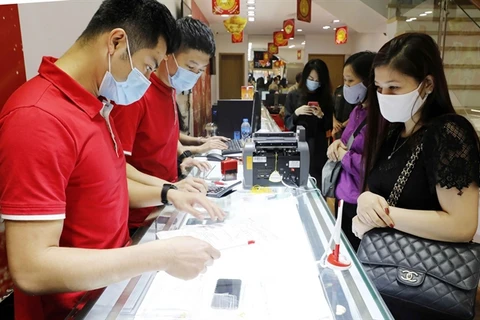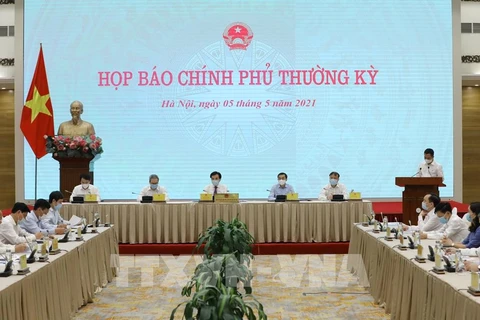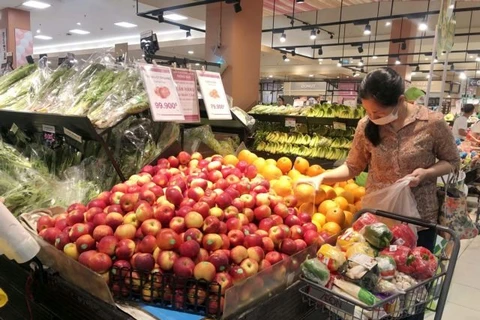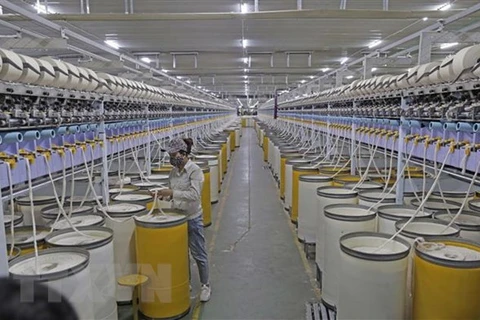Hanoi (VNA) – The average consumer price index (CPI) in the first four months of this year inched up 0.89 percent from the same period last year, the lowest rise for the first four months of a year since 2016 and clearing the way for the country to achieve its goal of keeping inflation at below 4 percent for the year as a whole, according to an official from the General Statistics Office (GSO).
“However, we should not be too optimistic about this since inflationary pressure remains and is likely to build up in the months to come,” GSO Deputy Director General Nguyen Trung Tien told the Vietnam News Agency.
The CPI, he said, will tick up on account of the global economy’s positive outlook, as noted by international organisations, and rising global COVID-19 vaccination rates.
In Vietnam, domestic businesses are becoming more adaptive to the “new normal”, with the gradual revival of production, trade, and services and growing demand for capital, fuel, and materials. This will drive up prices and add pressure to overall inflation, he explained.
Increases in the global prices of fuel and materials is another factor behind rising domestic prices, he continued, citing the fact that the average Brent crude price in the first four months increased nearly 24 percent compared to the end of last year and over 49 percent year-on-year.
The average price for Brent crude in 2021 is forecast to reach 60 USD per barrel, up about 40 percent compared to 2020, which is likely to push up domestic fuel prices by roughly 25 percent, adding 0.9 percentage points to the CPI.
He urged authorities not to loosen inflation control measures, saying they should maintain a close watch on local supply and demand and the price of essential goods, and take proactive and timely action. The Ministries of Industry and Trade and Finance, meanwhile, must effectively use the petrol price stabilisation fund to minimise the impact of fuel on overall CPI, he added.
“We believe the inflation target of around 4 percent, set by the National Assembly, is attainable,” Tien affirmed.
He further noted that International Monetary Fund (IMF) experts have been sent to Vietnam annually to review and assess sources of data, methods, and representative items Vietnam uses to calculate the CPI. Vietnam’s CPI has been used in reports from other international organisations, such as the UN Statistics Division (UNSD), the World Bank (WB), and the Asian Development Bank (ADB), and the method the country uses to calculate the index is regarded as being in line with international practices./.
“However, we should not be too optimistic about this since inflationary pressure remains and is likely to build up in the months to come,” GSO Deputy Director General Nguyen Trung Tien told the Vietnam News Agency.
The CPI, he said, will tick up on account of the global economy’s positive outlook, as noted by international organisations, and rising global COVID-19 vaccination rates.
In Vietnam, domestic businesses are becoming more adaptive to the “new normal”, with the gradual revival of production, trade, and services and growing demand for capital, fuel, and materials. This will drive up prices and add pressure to overall inflation, he explained.
Increases in the global prices of fuel and materials is another factor behind rising domestic prices, he continued, citing the fact that the average Brent crude price in the first four months increased nearly 24 percent compared to the end of last year and over 49 percent year-on-year.
The average price for Brent crude in 2021 is forecast to reach 60 USD per barrel, up about 40 percent compared to 2020, which is likely to push up domestic fuel prices by roughly 25 percent, adding 0.9 percentage points to the CPI.
He urged authorities not to loosen inflation control measures, saying they should maintain a close watch on local supply and demand and the price of essential goods, and take proactive and timely action. The Ministries of Industry and Trade and Finance, meanwhile, must effectively use the petrol price stabilisation fund to minimise the impact of fuel on overall CPI, he added.
“We believe the inflation target of around 4 percent, set by the National Assembly, is attainable,” Tien affirmed.
He further noted that International Monetary Fund (IMF) experts have been sent to Vietnam annually to review and assess sources of data, methods, and representative items Vietnam uses to calculate the CPI. Vietnam’s CPI has been used in reports from other international organisations, such as the UN Statistics Division (UNSD), the World Bank (WB), and the Asian Development Bank (ADB), and the method the country uses to calculate the index is regarded as being in line with international practices./.
VNA
























